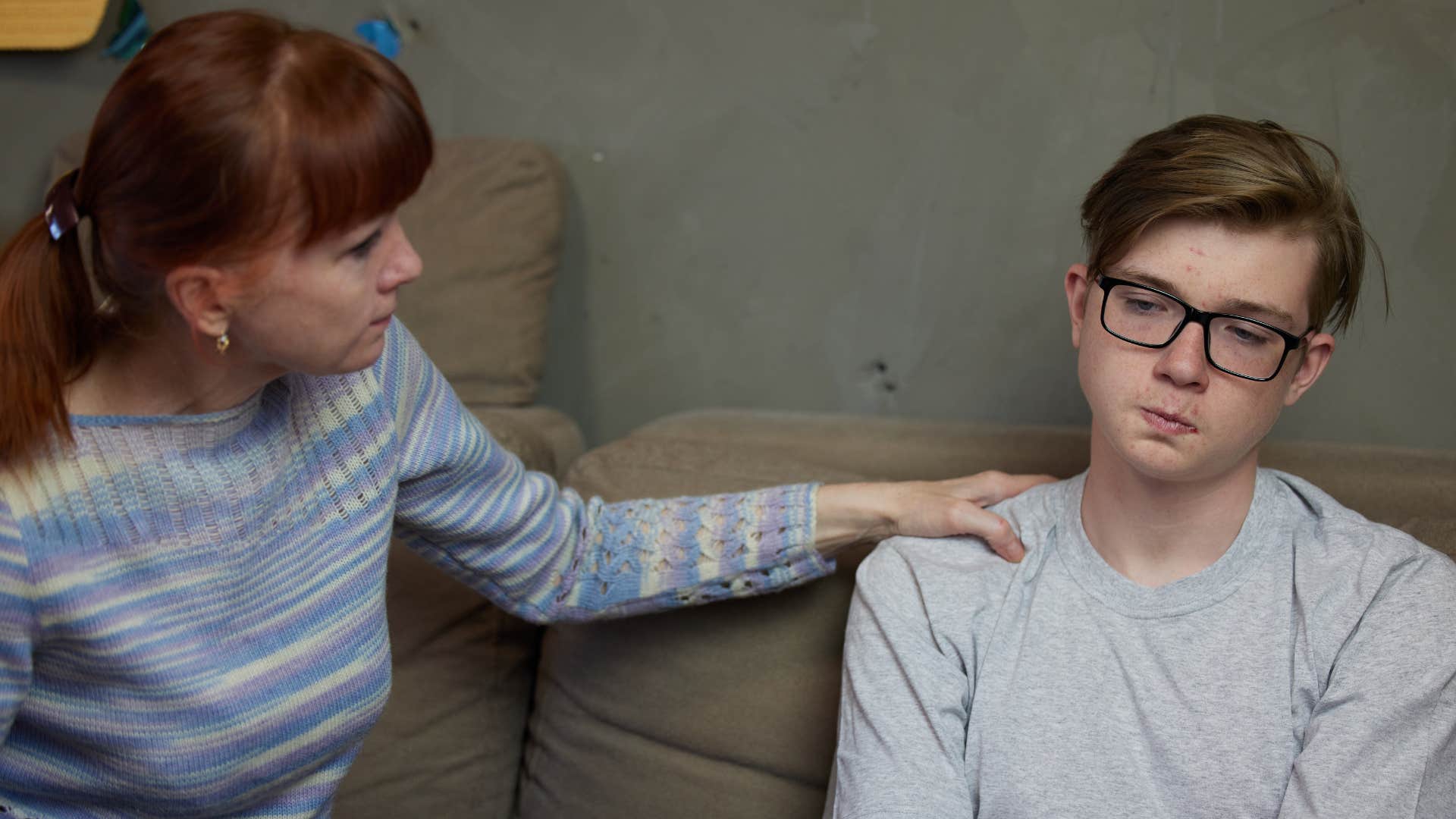11 Things Adult Children Do When They're Hiding How Much They're Struggling
They may be telling you how much they love their independence, but inside, they're really struggling.
 Yevhen Rehulian / Shutterstock
Yevhen Rehulian / Shutterstock When your grown children become physically or emotionally distant, it's important to remember that it may be because they are dealing with some form of struggle. They may be dealing with financial, physical, or emotional problems and not want you to worry.
Many of the things adult children do when they're hiding how much they're struggling may make you feel like they don't want you around. But these subtle attempts at concealing what's going on with them, such as several missed calls or avoiding coming over to visit you, can be quite telling. As they adopt certain behaviors that mask their inner battles, they try to maintain some illusion of stability. The only thing you can do as a parent is to remain supportive and be there for them when they are ready to finally open up.
Here are 11 things adult children do when they're hiding how much they're struggling
1. They become distant
 New Africa | Shutterstock
New Africa | Shutterstock
When your adult children begin to see their self-sufficient image crack under real-life pressures, then distance becomes a tool to try to control the perception of themselves in the eyes of others. To parents, this can feel confusing to see your children live their lives while at the same time actively choosing not to keep up communication with you. This hurts even more if you, as a parent, feel like you have been more than supportive throughout their lives.
Many will go as far as to never speak to their parents again, even if their parents didn’t do anything wrong. A study from Ohio State University found that 26% of adult children reported being estranged from their fathers compared to 6% estranged from their mothers. Behind the estrangement is the silent fear of disappointing others and a self-inflicted pressure to appear capable at all times.
2. They say they're busy constantly
 fizkes | Shutterstock
fizkes | Shutterstock
Being constantly busy offers your adult children control when their lives seem like the opposite. Jodie Clarke, MA, LPC, MHSP, discussed how staying consistently busy is often associated with higher self-worth and social status. However, it also highlights that over-scheduling can lead to neglecting themselves, which can result in stress, decreased self-esteem, and other health issues.
It's all a distraction, and the more that they run from the problem then the bigger the fallout from it they will face. They might fear disappointing you or appearing like they haven't figured out life yet. Instead of opening up, they put themselves into a rhythm of constant motion, hoping the noise of activity drowns out their struggles.
3. They avoid talking about themselves
 Chay_Tee | Shutterstock
Chay_Tee | Shutterstock
Conversations with family or friends will become more one-sided as your adult children struggle more in life. Everyone will know what's going on in the family except for your children. This is because they want to avoid talking about their lives and experiences to avoid people from judging them. Nothing might seem wrong to you because they are asking questions to others, but the fact that they never reciprocate should be your concern.
Admitting to difficulties might feel like an unwanted return to dependency, so they shut that part of their life down for conversation. This type of emotional distancing can strain relationships wherever they go. Loved ones may sense that something is off, but might not be sure how to help them. Either way, it's best to approach this with compassion rather than annoyance or frustration.
4. They overcompensate with positivity
 imtmphoto | Shutterstock
imtmphoto | Shutterstock
Your adult children will mask their insecurities and struggles with forced positivity. Rather than burden you or others, they will present themselves as overly cheerful people to deflect and distract. This exaggerated optimism can serve as protection from whatever internal struggles they are facing. This forced positivity comes from their childhood and the ability to deal with other emotions.
Adam A. Rogers, Ph.D., expressed that caregivers should allow their children to feel a range of emotions and provide support during challenging times rather than promote constant positivity, as it can lead to anxiety and depression. This might be a difficult thing to come to terms with, especially if you believe that you were a decent parent, but there are ways to help them get over this.
The good news is that you can help your adult child unlearn this toxic positivity by allowing them space to openly express how they are feeling with no judgments or worries.
5. They show sudden changes in habits
 Violator22 | Shutterstock
Violator22 | Shutterstock
Parents are the first ones to notice when there are specific changes in their adult child's behavior. If their children were great students, who followed the rules and never put a foot wrong, then when they begin to act the opposite, they can tell. Things like partying late at night or getting involved in risky situations when they should know better at just some of the first signs of a rogue adult child.
Unfortunately, for parents, these behavior changes tend to stem from their own relationships with their children when they were younger. Research has found that the quality of the parent-child relationship significantly affects adult children's risky behaviors.
6. They become financially guarded
 fizkes | Shutterstock
fizkes | Shutterstock
Grown-ups who refuse to talk about money will vaguely deflect to another topic of conversation. This guarded behavior can be their way of protecting their pride or shielding loved ones from worry. They will attempt to bypass any interrogation until they regain their footing financially. This is because they see accepting any type of help as a sign that they have failed, especially if they're trying to live up to fake independence or success.
Once someone enters adulthood, they want to believe that they will be able to support themselves financially without the help of their parents, but it's extremely rare in this modern age. According to a survey by Bankrate, 27% of adults at age 23 or older say that they have received ongoing financial assistance from their parents. Taking money from their family can make them feel like they have failed somewhere. This causes them to try and preserve their dignity by refusing help.
7. They decline help even when they need it
 Freeograph | Shutterstock
Freeograph | Shutterstock
Fearing to appear weak or incompetent is a real struggle that adults deal with, especially when it comes to dealing with the concerns from our parents. They can offer assistance, but we will sometimes decline to accept it for fear of admitting defeat. The reluctance comes from our pride and shame of making our parents worry about us.
Yet, the irony is that we choose to isolate ourselves instead, making the situation worse rather than seeking the help that we so desperately need. The more we go without help, the more we will stress ourselves out, which will make us even more depressed. It's important for families to recognize when certain members are being stubborn because it might just come from this mindset.
8. They use humor to deflect attention
 shurkin_son | Shutterstock
shurkin_son | Shutterstock
Using dark humor to deflect is a common coping mechanism for adult children who are silently struggling. Jokes and sarcasm become tools to shift focus away from deeper emotional pain. They will laugh off serious situations to cope because it's safer than being sad or vulnerable.
In conversations, they might make a witty remark or self-directed jokes to mask their insecurities. This is because it gives them a sense of control over the situation when everything around them feels chaotic. The downside is that many who interact with them will miss the signs that something is wrong until it's too late. A dark sense of humor might actually be a cry for help.
9. They seem more irritable than usual
 Gladskikh Tatiana | Shutterstock
Gladskikh Tatiana | Shutterstock
One of the more noticeable signs that your adult children are hiding how much they are struggling is if they become more irritable than usual. They may snap at friends or relatives over small, trivial things. These irritabilities stem from deeper feelings of stress and anxiety that they don't feel ready to share yet.
They are essentially frustrated with themselves over the decisions that they have chosen to make in life. Asking you for help would make them admit that they are struggling, which puts pressure on them. Children raised in environments where they believed that they needed to be perfect tend to continue this into adulthood. They want to show their parents that they have their life together because if they don't, then they fear it will make them and their parents look like failures.
10. They engage in escapist behavior
 SynthEx | Shutterstock
SynthEx | Shutterstock
Have you ever had one of your adult children suddenly do a vanishing act after asking them a simple question? Well then, chances are that whatever it is that you wanted to discuss triggered something in them. While sometimes escapist behavior can be a sign that your child is hiding something personal going on in their lives, it can also just be them trying to avoid a difficult conversation that they are just not ready to face. This can make it hard for them to be vulnerable with you.
Avoidance is a common coping strategy for middle-aged people dealing with tension in their relationship with their parents. This strategy is often employed to prevent conflict and maintain harmony, especially when their parents are older or have disabilities. So, it might not be that they are keeping secrets, but actually worried about something that they simply can't control.
11. They appear fine but lack joy
 fizkes | Shutterstock
fizkes | Shutterstock
Your children who are struggling will put on a brave face to seem fine to those around them. They will keep their challenges and, more importantly, their wins private from others. They may also appear distracted, as if they are staring into nothingness while you are trying to connect with them.
These behaviors may have started in early childhood when you noticed that they appeared fine but tended to lack any joy in things that normal children would have been excited about. Childhood depression is a strong predictor of adult mental health issues. People who experienced depression as adolescents have nearly three times the odds of experiencing depression in adulthood. The best thing as a parent or relative is to try to get them to open up or get them to seek help.
Sylvia Ojeda is an author who has over a decade of experience writing novels and screenplays. She covers self-help, relationships, culture, and human interest topics.

